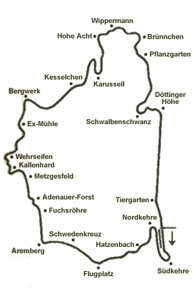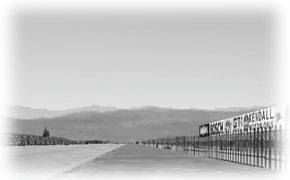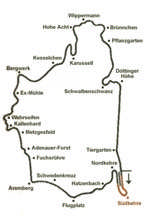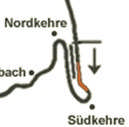LOR Trackguide Nuerburgring
Contents
General
THE 14.189 MILE Nurburgring circuit; 174 turns and about 90 gear changes per lap. What else do you need to say about it? It's a cliché, but it is the ultimate driver's track. There is no other track in GPL, let alone any other form of racing, that even comes close to the Nurburgring. This is where the physics engine truly gets to shine. The suspension is pushed to its limit numerous times each lap. Getting airborne is all part of the fun. This track is a true test of driver skill, separating those drivers who are quite fast from those who are truly talented. To be able to put together 15 fast laps without making an error is a huge accomplishment. Getting that one perfect fast lap for qualifying is also a huge accomplishment. Unlike the other ten tracks on the 67 calendar, then Ring has to be driven differently in the race than it is during a qualifying run. There are many turns and hills that cannot be taken anywhere as quickly in a race with a full fuel load as they can be during qualifying. If you don't realize this, you won't last the distance. The driver that can put in a fast qualifying lap as well as a controlled and restrained race lap will succeed here.
At over 8 minutes, the length of the the lap is significant. If your best time is a 8:30 it may seem impossible for you to figure out how people are doing 8:10 laps. However with 174 turns, if you shave just one tenth of a second off each turn, you will gain 17.4 seconds a lap. Shave just one hundredth of a second off each turn and you have 1.74 seconds. Relaxation is the key. This is tough as there are not many places to relax, but you have to be calm in order to keep the car together for 8 minutes. Over all, just enjoy it. Try a few laps a day and you'll improve. Learn the line first before anything else, as that's where you will gain time.
You need to have realistic goals that help you improve bit by bit. First try getting around the track without having to stop for directions. Then go for a time less than, say 11 minutes, then 10, 9:30, then 9, then 8:45, etc. This will be much more beneficial than going out trying to do an 8 minute lap right away.
Car Setup
Before you start changing anything with setup you should be able to lap the circuit in less than 8:30. Before that time gained will come from you knowing the correct line and braking points for the turns. The default setup is perfectly fine for getting fast times. In fact my setup hardly differs at all from the default one. So learn the track, and when you are consistently about to do a lap below 8:30 then think about modifying your setup.
Like everything else associated with the Ring, car setup is difficult. Looking at the circuit, there exists every type of corner imaginable. The most important aspect of your car is that it stays on the ground as much as possible and doesn't bottom out much. You will take off, and you will bottom out at several points during the lap, but minimizing this will give your more control. With this in mind, ride height is the first place to start. One that is too low will see you hitting the ground all the time. However, if you make it too high then you'll feel very loose at the top of hills, which is not good if you are trying to get round a corner at 120 mph or so. I find that a medium ride height works best, in the 3 to 4 inch range, with the rear of the car slightly higher than the front.
The next place to look is gearing. You need a tall fifth gear for the long back straight. However, most of the rest of the track is spent accelerating from slow corners to medium speed corners. So set up the gearing to help you get from 60 to 140 as quickly as possible. This will probably mean you have a larger than normal gap from 4th to 5th, but that is a trade off that is acceptable over the lap. Use the back straight to set fifth gear. You should be at redline just before you reach the bridge. The rest of the gears are personal preference. But keep them evenly spaced, with fourth topping out around 155 mph or so. That should provide you with good acceleration on most turns.
Next you should look at the suspension. You need good grip coming out of the slower turns, but also have to have great grip on the high speed turns, all of which seem to come right at the crests of hills. You may need to make a slight trade off between all out grip under acceleration and the ability to stay on the track when your suspension is maxed out. I tend towards the latter. A neutral setup is also important. One that understeers off the track, or oversteer at the top of hills won't help you complete a lap. So setting the roll bars to similar values and putting a little more wheel rate on the rear tyres is the best starting point. Then if you are trying to beat that 8 minute lap, you may consider tweaking things a little.
Most of the turns at the Ring require only very light braking. Just to make this difficult, though, most of these braking zones are during turns, meaning you can't set the balance to far towards the rear. There are also some very heavy braking zones thrown in here and there. With this in mind, set up the brake balance fairly far forward.
Click here to download the Ferrari setup I used for this lap.
Lap Times
Your lap times during the race should improve every lap. The fuel load will decrease by several gallons each lap allowing you to go several second faster each lap. You will probably be about 10 seconds off your qualifying time during the first few laps. As the race progresses you should be able to get down to within 5 seconds or so. The qualifying lap should be a one off thing. You have a full 8 minute warm up lap. Make sure you don't push too hard on this out lap, or you risk having to start all over again. Just getting a timed lap in during practice will probably put you in the top 3/4 of the grid. So take the lap fairly easy until you reach the Karussell, and then start pushing to get into a rythym. Then really go for it. It's really hard to keep the concentration up for more than 8 minutes but you have to do it. Once you have a good time, spend the rest of the session getting used to the car with full tanks, as it is very different.
Turns
As there are 174 turns per lap it could get quite difficult to keep track of which turn we are discussing. Therefore the guide is split up into sections, as indicated on the map above. The turns within each section are described as 'first turn', 'second turn', etc. Some turns are grouped together because they are either so close, or create what is essentially one long ess bend, or left or right hander. There are also some curves which are not discussed because they can easily be taken flat out and have no real bearing on other corners. If the line through one of these turns does affect the following turn, then it will be discussed briefly in conjunction with the following turn.
The Replay and the Line
When watching the replay you may notice that some of the lines I take through a turn or the speed I maintain through a turn do not exactly match what is decribed below. This is because it is extremely difficult to put together that perfect lap, hitting every apex just right at just the right speed. If I did that I'd be lapping in the 7:40 range! So what is explained below is ideal.
Pictures
All the pictures included in this guide are thumbnails for larger versions. It is recommended to click on the thumbnail to view a larger, more detailed version of the picture. They are all taken from the chase view as I think that gives the best overall view of where the car is on the track. However, I suggest that you always use the in-car view for actual driving.
Goals
You should aim for a qualifying lap of about 8:05.00 to 8:20.00. That should put you pretty far up the grid. During the race you should aim for 8:10.00 to 8:30.00, depending on fuel loads, for your lap times if you don't encounter traffic. The replay is 8:04.16 for the Ferrari.
You won't lose several seconds just by reading this, that takes practice and experience. But, hopefully, this will help you get there faster.
Definitions
Arrival time at the corner - this is the approximate time when you should be arriving at your braking point for the corner.
Time to negotiate corner - this is the approximate time it should take for you to get from the braking point of the corner to the point at the exit when you are 'done' with the turn.
Exit time of the corner - this is the approximate time when you should be 'finished' or pretty much done turning and heading in a straight line at the exit.
Entrance speed - this is the speed you should be doing when you reach the braking point.
Speed through the corner - this is the slowest speed reached during the corner.
Maximum braking - As hard as you can brake before locking your wheels.
Note - The different handling characteristics of the cars in GPL means that exactly how fast you are through a turn, or where you start braking or accelerating will vary slightly. However, these points are fairly close in all cars, and, of course, the concept is the same.
The Race
The race at the Nurburgring is quite difficult from qualifying. As mentioned above there are several corners that can be taken flat during qualifying that can't be taken flat during the race. There are several places where a car with full fuel will bottom out as well. You need to be aware of all these places before the race starts. Attrition is a huge factor at the Ring. Just finishing will usually put you in the points. So that should be your first objective. Make sure you drive within your limits here. If someone behind you is pushing you, even for position, it may be better for you to let them by. Who knows, you'll be more likely to finish and they might overdo it. The start is interesting, and can be messy. The front straight is very wide so overtaking is a possibility. But then it funnels down into a very slow left hander. Two of the three overtaking opportunities on the lap will present themselves within the first three corners of the race, so there is a great attempt to get by those people ahead of you before you get into turn four. This can lead to big pile ups in turn one. Make sure you know when to brake for the turn one from a standing start. Practice some standing starts to find this point. If there are people ahead, make room for them.
The Ring usually has huge differences between qualifying times. If the guy on the row ahead got a bad start, but can lap 20 seconds a lap faster than you, you are foolish to try and pass them into turn one, as they will be able to push you extremely hard without exerting themselves much. The result is that you will probably go off track, and they'll just cruise by. So, take it easy at the start and just get through to turn four. After that the race really gets going. Unfortunately at the Ring there are only three real overtaking opportunities. The first is turn one, then turn three, then the back straight. Besides that you are constantly turning, so getting close enough to overtake is not an option unless the car ahead makes an error. The best you can do is to wait for those three places, and push the car ahead in the meantime, hoping they make a mistake. But overall, finishing the race will put you in a good position for points.
First Corner (Left Hander)
- Entrance speed: approximately 170 mph [274 kph]
- Speed through the corner: approximately 60 mph [97 kph]
- Arrival time at the corner: 5.63 seconds
- Time to negotiate the corner: 6.09 seconds
- Exit time of the corner: 11.72 seconds
Approach
This left hander is one of the few threshold braking zones on the track. It is preceded by the long front straight, which makes it one of the few overtaking opportunities. The difficulty associated with this turn is that there is no real braking reference point. You just need to judge it, which means you can easily brake too soon or too late and get passed, or just mess-up the corner. The advantage you have over a car trying to pass you is that they know this is one of the few chances they have at passing you, and may overdo their braking as well.
Apex and Exit
You'll be in top gear under full acceleration as you pass the pits. Gently move the car over to the right side of the track in preparation for braking. A couple of beats after you pass the pits, the racing groove will darken. Farther ahead, about the same place as the grass comes up to the fence on the left, the groove darkens again. Approximately halfway between these two points is when you should start to brake. Brake as hard as possible and continue in a straight line on the right side of the track. Don't turn in too soon, as you may lose the rear end. As you continue to decelerate, start to shift down to second gear. Start to turn in once you are almost on top of the corner. Any sooner and you'll have a bad line into the following right hander. As you turn in, ease off the brakes a little, helping you to turn in quicker. Then about midway between your turn-in point and the apex at the grass get off the brakes altogether.
Once off the brakes, you should stabilize the car with the accelerator. This will also prevent you from losing any more speed. Take a late apex, clipping the grass as you do so. Straighten the wheel out fairly fast, and start accelerating as hard as possible in second gear. Let the car move towards the middle of the track as you leave the turn.
It's one of the easier ones, but one down, one hundred seventy-three to go.








